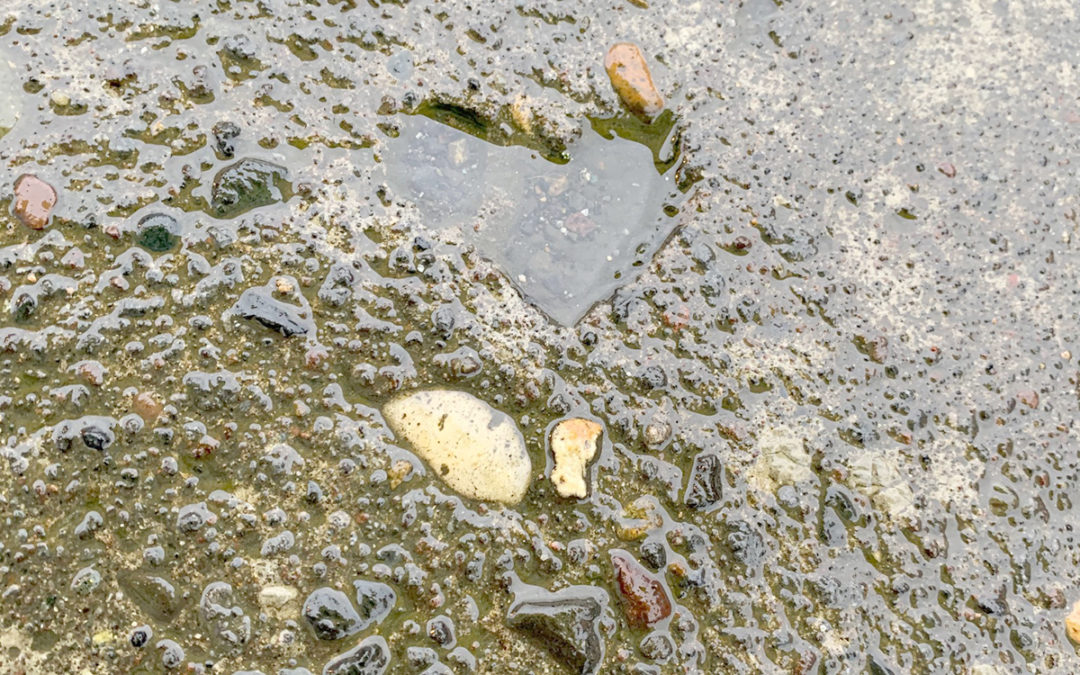My son was delighted to figure, as we walked, that he was not only five, but five and a half, and like only a person that age can genuinely do, he sang a song about being five and a half. Wearing waterproof boots, he greeted every puddle with enthusiasm. The deeper the puddle, the bigger his excitement. In fact, when he saw a puddle coming that looked extra deep, he gasped and exclaimed, “my dream!” (Imagine, to have that and only that be your dream.)
His song and his easy delight inspired me to see through new eyes, too. It was last week, before even the great outdoors closed, and we were having a hike. Deep into Week One of this new, other, scary, unfamiliar world—during a time torn free of any context my living history has to offer—I took my fear and my son by the hand and we stepped out into the wilderness. The clouds were dense and low in the sky; the air was cool. Rain spat intermittently and we walked anyway, armed with umbrellas, determined to get out and breathe fresh air, commune with nature. Sprays of yellow wildflowers along the path and rolling blankets of bright green vegetation rewarded us for enduring the cold and wet.
We marched (truly marched, with knees rising high and arms pumping mechanically at our sides) along a muddy trail snaking down and winding up, punctuated with mineral pebbles and rivulets and abound with dreams. There were zero other people. We saw not another soul save those of trees, which had the effect of making me feel as though we were visiting a new, colorful planet void of humans.
When my son tromped through an especially deep puddle, with all the fearlessness afforded by his mere handful of years of existence, we heard a very loud and seemingly angry croak coming from the water. It was so loud, in fact, that it startled us both to leap away. Without seeing one, I assumed it must have been a frog that was angered by the brazen invasion into its home.
But it just as easily could have been the puddle, itself, as we were on a new and unfamiliar planet where water is alive and conscious and has a voice.
“That puddle just yelled at you,” I said, and he cracked up. His laugh is so contagious, I caught it right away and laughed, too, which renewed his laughing, and our circle of laughter seemed to echo against the valley walls, and rise again from the face of the puddle whose voice had just scared us. The humor made the puddle forget its anger, and us forget our fear, at least for long enough to enter fully into the joy of that moment. We found ourselves giggling, treading the dirt path around and around the living puddle, suddenly swept into a kind of worship dance. The path stretched up on both sides, rough with rocks and roots, and we were at its depth—leaping like hares in a chorus of laughter with a conscious, sentient pool of water, settled now in the land’s own nadir, so clear we could see the shine of stone underneath, and there was no frog in sight.
We crouched over it and peered inside.
“Say something, puddle,” he said.
Quietly, reverently, we listened and watched. Through my borrowed lens, I saw, perhaps, what he saw: shimmering, vibrating specks of light—the actual hydrogen and oxygen molecules in their configurations of two-to-one, staring back at us with a new vitality. Like a flock of birds, the molecules act as one and share a thinking apparatus: move this way, flow that way, splash, roil, become clouded with mud, settle, turn stunningly clear.
Just as I have no memory of any previous contagion the world has ever seen causing this level of disruption and mass fear bordering on panic, I have no memory of ever hiking so beautiful a trail, having it solely to myself, and being afforded a way of seeing like a child. Along the way, almost without noticing, I let go the hand of fear and held fast to my new boy’s hand, whose fear comes quickly like a startle and disappears just as quickly, replaced entirely by joy.
Rogue and unpredictable, it is a time where there is nowhere else to go but outdoors, onto trails, rain or shine, and nothing to pay attention to (outside of the low and ever present hum of fear) except every detail on offer: gravel and slag, rocks of myriad size and shape, mostly round but sometimes heart-shaped, just to remind me that love still is, always has been, always will be, and it is up to me whether to be present to it.
Reluctantly, we climbed out of the valley, away from the shouting, laughing puddle.
Low clouds pushed a cool, wet breeze to raise gooseflesh on our skins as we went—a refreshing balm to the inner heat generated by trudging uphill. The fear was gone then. And for a time there was nothing at all but grass and moss, brushy trees and brightly lit flowers, and of course, dream-come-true mud puddles everywhere.


Recent Comments